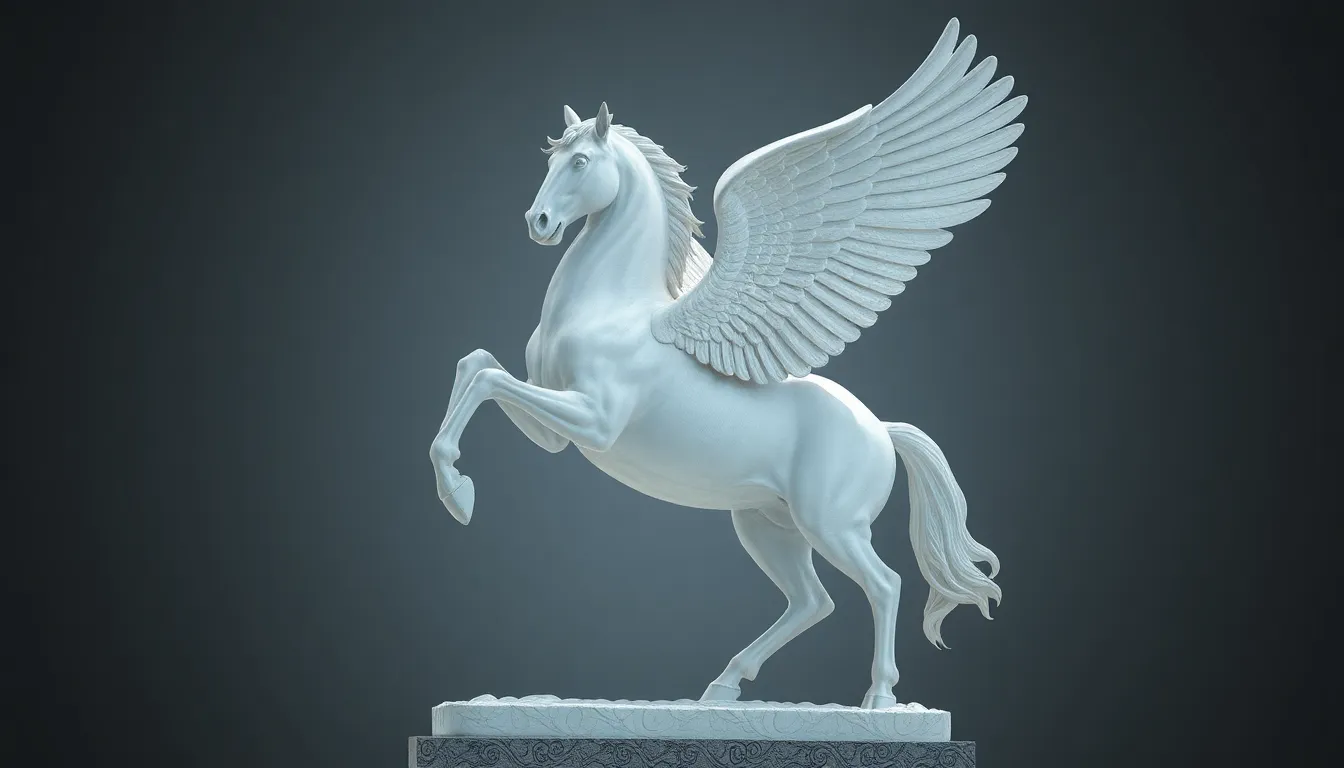Understanding Pegasus: The Significance of the Winged Horse in Myth
I. Introduction to Pegasus
Pegasus, the majestic winged horse of Greek mythology, stands as one of the most iconic creatures of ancient lore. Often depicted as a striking white horse with large, feathery wings, Pegasus represents not only the fantastical elements of mythology but also the deeper meanings associated with creativity and inspiration in human culture.
Mythological creatures like Pegasus played a significant role in ancient societies, serving as symbols of various human experiences and emotions. They provided a framework for understanding the world and offered insights into the collective psyche of people in ancient cultures.
II. The Origins of Pegasus
The story of Pegasus’s origin is as remarkable as the creature itself. According to myth, Pegasus was born from the blood of Medusa, a Gorgon cursed to have snakes for hair. When the hero Perseus beheaded Medusa, the blood that spilled forth gave rise to Pegasus and his brother Chrysaor, a giant wielding a golden sword.
Pegasus’s connection to the hero Bellerophon is also noteworthy. Bellerophon, a son of Poseidon, embarked on a quest to slay the Chimera, a monstrous creature that breathed fire. With the aid of Pegasus, who he tamed with a golden bridle gifted by Athena, Bellerophon was able to conquer the beast, showcasing the bond between human and divine in Greek mythology.
III. Symbolism of Pegasus
Pegasus is rich in symbolism, representing various themes that resonate throughout human history:
- Inspiration and Creativity: Pegasus is often depicted as a symbol of poetic inspiration. The creature is associated with the Muses, the goddesses of the arts, embodying the idea that creativity can elevate the human spirit.
- Freedom and Transcendence: With his ability to soar through the skies, Pegasus symbolizes freedom and the transcendence of earthly limitations. This aspect of Pegasus reflects humanity’s desire to rise above challenges and reach for greater heights.
IV. Pegasus in Ancient Literature
Pegasus has been a prominent figure in classical texts, influencing countless stories and poems throughout history. Notable references include:
- Hesiod’s Theogony: Here, Pegasus is mentioned as a divine creature that emerged from the blood of Medusa, symbolizing the connection between chaos and order.
- Ovid’s Metamorphoses: Ovid elaborates on the adventures of Bellerophon and Pegasus, showcasing their heroic deeds and the trials they faced together.
The portrayal of Pegasus in literature has not only captivated audiences but has also inspired future storytelling, making the winged horse a recurring motif in various literary traditions.
V. Pegasus in Art and Culture
The depiction of Pegasus in art spans centuries and cultures, illustrating the creature’s enduring appeal:
- Ancient Sculpture and Pottery: In ancient Greece, Pegasus was frequently depicted on pottery, reliefs, and sculptures, often shown alongside Bellerophon in scenes of triumph.
- Modern Interpretations: Today, Pegasus continues to inspire artists, writers, and filmmakers. His image appears in various forms of art, from paintings to contemporary literature, symbolizing the same themes of inspiration and freedom.
VI. Pegasus in Astrology and Astronomy
Pegasus has also found a place in the realm of astronomy, manifesting as a constellation:
- The Constellation of Pegasus: This constellation is recognizable for its square shape, often referred to as the “Great Square of Pegasus.” It is prominent in the autumn sky and is one of the 88 modern constellations.
- Astrological Significance: In astrology, the constellation Pegasus is associated with creativity, intellect, and the pursuit of knowledge, reflecting the characteristics attributed to the mythical horse.
VII. Legacy of Pegasus in Contemporary Society
Pegasus’s legacy extends into contemporary culture, where his image and symbolism continue to thrive:
- Pegasus in Popular Culture: The winged horse has appeared in numerous films, books, and video games, often representing heroism and the quest for greatness. Examples include Disney’s animated film “Hercules” and Rick Riordan’s “Percy Jackson” series.
- The Enduring Appeal of Mythological Symbols: Mythological figures like Pegasus resonate with people today, providing a sense of wonder and inspiration. They serve as reminders of the power of imagination and the enduring nature of storytelling.
VIII. Conclusion
In summary, Pegasus stands as a significant figure in both Greek mythology and broader cultural contexts. His origins, symbolism, and representations in literature and art highlight his importance as a creature that embodies inspiration, freedom, and transcendence.
As we reflect on the relevance of mythological figures like Pegasus in today’s society, we recognize their ability to inspire creativity and evoke a sense of wonder, reminding us of the timeless nature of these ancient stories.




